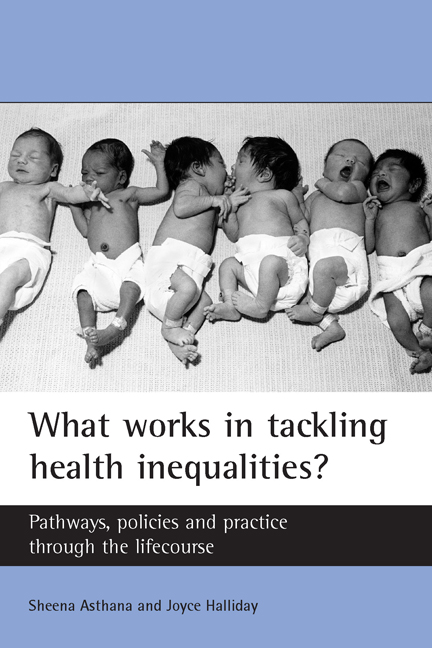Book contents
- Frontmatter
- Dedication
- Contents
- List of tables, boxes and figure
- Acknowledgements
- List of abbreviations
- one Introduction
- Part 1 The research and policy context of health inequalities
- Part 2 Health inequalities pathways, policies and practice through the lifecourse
- Part 3 Tackling health inequalities: developing an evidence base for public health
- Index
five - Early life: policy and practice
Published online by Cambridge University Press: 14 January 2022
- Frontmatter
- Dedication
- Contents
- List of tables, boxes and figure
- Acknowledgements
- List of abbreviations
- one Introduction
- Part 1 The research and policy context of health inequalities
- Part 2 Health inequalities pathways, policies and practice through the lifecourse
- Part 3 Tackling health inequalities: developing an evidence base for public health
- Index
Summary
Introduction
As Chapter Four noted, the early years represent a critical period for interventions designed to reduce health inequalities. Inequalities themselves are manifest, exposure to disadvantage is recognised as having lasting effects on health and socio-economic status in later life, and there is strong evidence that childhood health inequalities can be reduced (Mielck et al, 2002). This strategic importance was underlined by the Independent Inquiry into Inequalities in Health (Acheson, 1998). This identified improvements in early years support for children and families as one of five actions likely to have the greatest impact over time. This emphasis has been maintained. The national targets for health inequalities, prefigured by the NHS Plan (DH, 2000), thus focused, for example, on reducing the difference in infant mortality across social classes by 2010 (alongside inequalities in life expectancy), while the White Paper Tackling health inequalities (DH, 2003a) took support for families, mothers and children as one of its four central themes. The government's long-term goal of first halving, then eradicating child poverty altogether has also ensured scrutiny of the key public services that contribute “to improving poor children's life chances and breaking cycles of deprivation”, including early years services, parenting support and education, as well as welfare reforms (HM Treasury et al, 2004, p 12).
This chapter focuses first on the health behaviours that the research evidence in Chapter Four suggests are the key targets for intervention: smoking cessation, nutrition and parenting education. It outlines the range of effective interventions at our disposal and considers the political and practical response. Consideration is then given to the local delivery of two important structural targets: early years education and childcare. The significant issue of childhood poverty underpins the discussion. The enduring tensions between policies that aim, for example, to increase maternal participation in the workforce and those that stress the importance of parental input in early life are recognised, despite the creation of a Minister for Children, Young People and Families. This has led to calls for a politics of parenthood (Moss, 1999), capable of debating the contested domain between employment and caring, including the salient issues of time and gender.
- Type
- Chapter
- Information
- What Works in Tackling Health Inequalities?Pathways, Policies and Practice through the Lifecourse, pp. 153 - 212Publisher: Bristol University PressPrint publication year: 2006



